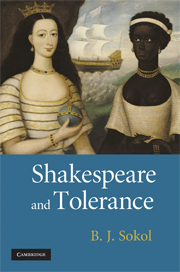Book contents
- Frontmatter
- Contents
- List of abbreviated titles
- Introduction
- 1 Shakespeare, jokes, humour, and tolerance
- 2 Shakespeare, gender, and tolerance
- 3 Shakespeare, tolerance, and nationality
- 4 Shakespeare, tolerance, and religion
- 5 ‘Race’, part one
- 6 ‘Race’, part two: Shakespeare and slavery
- 7 Afterword: tolerance as a species of love
- Notes
- Bibliography
- Index
3 - Shakespeare, tolerance, and nationality
Published online by Cambridge University Press: 20 August 2009
- Frontmatter
- Contents
- List of abbreviated titles
- Introduction
- 1 Shakespeare, jokes, humour, and tolerance
- 2 Shakespeare, gender, and tolerance
- 3 Shakespeare, tolerance, and nationality
- 4 Shakespeare, tolerance, and religion
- 5 ‘Race’, part one
- 6 ‘Race’, part two: Shakespeare and slavery
- 7 Afterword: tolerance as a species of love
- Notes
- Bibliography
- Index
Summary
the residence of continuance of one nation in one place is not of the law of nature which beinge in itt selfe immutable would then admitt no such transmigration of poeple and transplantation of nations as in dayly experience we see.
Of my nation? What ish my nation? Ish a villain and a bastard and a knave and a rascal? What ish my nation? Who talks of my nation?
PROSPECTUS
In Shakespeare's age political and cultural perceptions of what constituted nationality tended to diverge: this circumstance will underlie the twofold structure of this chapter.
On both sides of this divide, nationality in the Renaissance was often a shifting or emerging concept, and certainly this was the case in Elizabethan England. In terms of cultural mythologies, scholars and artists forged and/or questioned British origin myths. In the realm of political constructions, English lawmakers refashioned the limits of citizenship and alien status.
Moreover, mythic–historical and mythic–jurisprudential thinking joined in novel, highly influential theories that an essential ancient Englishness was the basis of the immutable English common law: scholars have argued that these theories had a great deal of fictional content. So in several ways English nationality was both a prominent and yet an evidently constructed entity.
Because of the dual nature of the constructions of nationality in accord with either legal specification or else with perceptions of cultural difference, this chapter will be divided into two portions, one of which could be labelled ‘Alien Statutes’ and the other ‘Exotic Foreigners’.
- Type
- Chapter
- Information
- Shakespeare and Tolerance , pp. 57 - 89Publisher: Cambridge University PressPrint publication year: 2008



